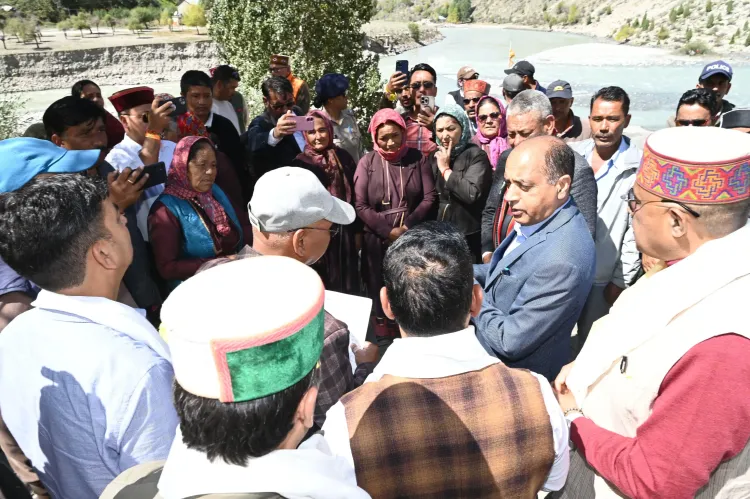Why are high-value vegetables rotting in Lahaul?

Synopsis
Key Takeaways
- Farmers are suffering significant losses due to rotting crops in Lahaul Valley.
- Delayed restoration of roads has compounded the problem, hindering transport.
- Government accountability is crucial for supporting affected farmers.
- Economic stability of the community is at stake with reliance on a single crop.
- Upcoming apple harvest offers a glimmer of hope for local growers.
Manali, Sep 24 (NationPress) Farmers residing in the frigid desert of the isolated Lahaul Valley in Himachal Pradesh, which typically thrives with vegetables, especially the high-value exotic broccoli and lettuce, are now suffering significant losses as their cash crops are decaying in the fields.
The cause of this predicament? An unusual delay in the restoration of road connectivity by the government after multiple landslides caused extensive damage, repeatedly closing the Keylong-Manali-Kullu-Mandi highway during August and September.
Public transport and tourist vehicles were also stranded for days. BJP leader and former Chief Minister Jairam Thakur, who initiated a two-day visit to the arid Lahaul Valley on Wednesday, shared with IANS via phone that crops like cauliflower, peas, potatoes, broccoli, and lettuce are currently rotting in the fields.
“Due to the government's failure to restore road access in a timely manner, many farmers chose not to harvest their crops. The sight of rotting cauliflower, broccoli, and peas has become commonplace, and villagers reported that no government officials visited to assess the damages,” the Leader of Opposition noted during his interview.
He emphasized that with farmers relying on a single annual crop, their economic stability is severely threatened.
“The state government must step up and compensate farmers for their negligence in reopening roads,” he urged.
Thakur remarked that there was an excellent cauliflower yield this season in Lahaul.
“Now, the crops are decaying in the fields, raising concerns of a potential epidemic. Farmers have incurred losses amounting to millions of rupees. How will they receive compensation? The government's lack of awareness regarding the extent of damage is alarming. They need to implement effective measures immediately.”
Each year, a substantial portion of vegetables, particularly peas and cauliflower, from the Lahaul Valley reaches markets across northern India, where prices are favorable due to the monsoon's impact on vegetable production in other areas.
The village of Lindur is on the brink of collapse due to severe erosion, leading to calls for the relocation of its residents. Thakur pointed out that cracks have formed in homes in Lindur due to heavy rainfall, making the entire village unsafe for living.
The Lahaul Valley experiences a cultivation season of less than five months, lasting from May to September, characterized by cold, arid conditions with limited rainfall and heavy snowfall.
Locals like Lal Singh Negi, a pea grower near Keylong, the district capital of Lahaul-Spiti, noted the valley's normally low rainfall levels.
“This year, due to the unusual monsoon of 2023, we’ve experienced excessive rainfall, causing cracks in many mud houses. The frequent rains have also lowered temperatures, adversely affecting overall crop yields,” he said.
The area dedicated to vegetable cultivation, a crucial part of the local economy, spans approximately 2,200 hectares, but residents are now pinning their hopes on the upcoming harvest of high-value apples.
Grower Jiwan Thakur mentioned that the apple harvest in Lahaul has yet to commence.
“We are optimistic that our apples will reach the markets without any obstacles, aiding in recovery from the vegetable losses.”
According to horticulture experts, the harvest of delicious, high-quality apples from the Chango, Ribba, and Namgiya valleys of Kinnaur and Hurling in Lahaul and Spiti, which dominate the market in India, is set to begin at the end of October.
The Lahaul Valley, once known for producing bitter-tasting hops, is now recognized for cultivating valuable seed potatoes, a tradition that dates back to 1854 when missionary A.W. Hide from Germany established a farm near Keylong.
The valley, adorned with small hamlets, produces the country’s pest-resistant seed varieties — Kufri Chandramukhi and Kufri Jyoti — along with ‘Table Santana’ and ‘Shafordi’ varieties, which are utilized for chip production.
(Vishal Gulati can be contacted at vishal.g@ians.in)









